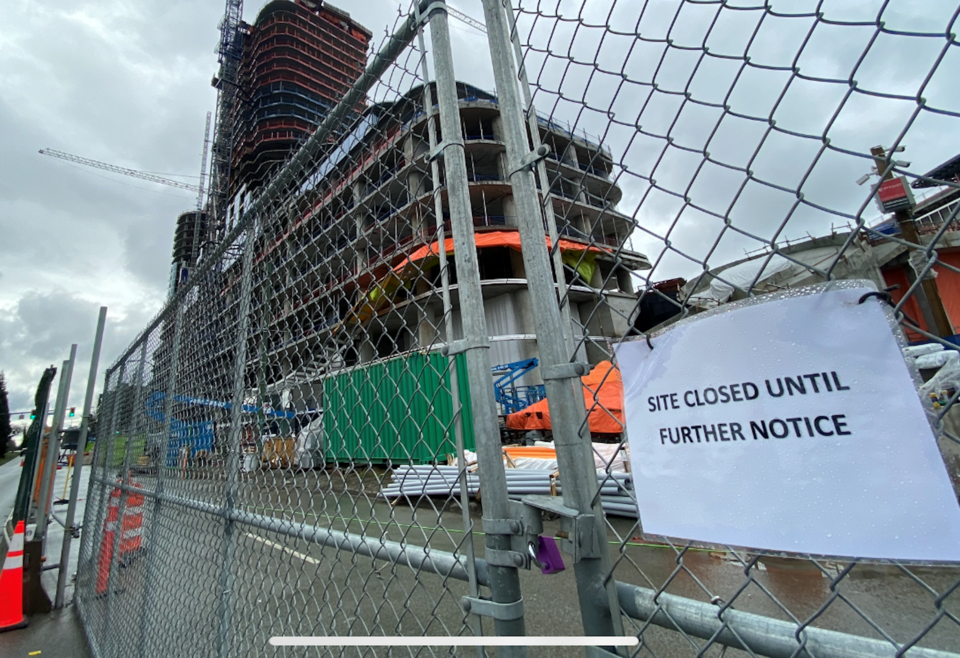Three weeks before a worker was killed by a fallen crane load at the Oakridge Park luxury condo construction site in Vancouver, the union representing hundreds of crane operators across B.C. issued ominous calls for the provincial government to impose mandatory training and certification for all crane workers.
Brian Cochrane, business manager for the International Union of Operator Engineers Local 115, stated Jan. 31 he and others were worried about a recent rash of crane accidents, while pointing the finger at a loosely regulated industry.
“We don’t know the exact cause of these incidents, but we do know in an industry with no real regulation, mandatory training or contractor licensing, these incidents keep happening. We’re glad no one was seriously hurt or killed. Today was a disruption; tomorrow it could be deadly,” stated Cochrane, referring to crane accidents in Surrey and Burnaby last month.
On Tuesday, a day before the death at Oakridge, the union issued a second call for regulations after RCMP in Kelowna announced criminal charge recommendations to the BC Prosecution Service in relation to the deaths of five crane operators on July 12, 2021 due to a tower crane collapse.
Cochrane said the charge recommendation “should provide the impetus for B.C. to mandate licensing and certification for all workers who assemble, erect, climb, reposition, or dismantle tower cranes.”
"B.C. missed the opportunity to lead immediately following the Kelowna crane collapse. Now we must be leaders in tower crane safety across Canada to ensure this never happens again,” said Cochrane.
On Wednesday, Vancouver Fire Rescue Services confirmed one person died after a load of materials detached from its crane and fell to the ground from 30 storeys above, hitting the building and eventually falling on the worker.
On Thursday, the site on Cambie Street nearby 41st Avenue was closed and pieces of the building were seen falling off at one point.
The Vancouver Police Department said it is investigating the incident but as of Thursday had not identified the worker in any way. Police spokesperson Const. Tania Visintin said WorkSafeBC “is the lead on the investigation.”
WorkSafeBC, a government agency tasked to investigate workplace accidents, said it was investigating the incident. It did not make anyone available for an interview but spokesperson Ashley Gregerson issued a written statement:
“Any worker death is tragic, and we send our thoughts and our deepest condolences to the family, co-workers, and friends of this worker.
“This is the third incident involving a crane this year being investigated by WorkSafeBC. Preliminary evidence, at this time, suggests there are few, if any, similarities between the three incidents, or the equipment involved.
“However, the three incidents demonstrate that workplace safety can never be taken for granted, and while each of the three recent incidents appear to be unique, employers are reminded of the need to be vigilant in ensuring the maintenance of their equipment and the safe working procedures of their staff.”
WorkSafeBC did not name the crane company or contractor involved in the project being developed by Westbank.
Gregerson referred Glacier Media to a media backgrounder on tower crane safety dated February 2024. In summary, the backgrounder claims WorkSafeBC conducts an inspection initiative program via the Provincial Crane Inspection Team that collaborates with BC Crane Safety (BC Association for Crane Safety), an organization that does certify crane operators specifically and under the Occupational Health and Safety Regulation, Cranes and Hoists (OHSR).
The backgrounder states there are two initiatives underway to strengthen regulations: one, to require employers to submit a “Notice of Project” for tower crane erection, climbing, repositioning, and dismantling; and another to define the term “safe for use” in the context of the certification required after an annual equipment inspection.
Another WorkSafeBC backgrounder titled Certification of Crane Operators in B.C. states BC Crane Safety developed the certification process in close consultation with WorkSafeBC. The program deals with boom truck, mobile and tower crane operators who must "pass a skills assessment relating to the type of crane that they currently operate, or wish to operate in the future."
BC Crane Safety declined an offer to speak specifically to its certification process but referred to its website bccranesafety.ca.
WorkSafeBC states there are “approximately 650 credentialled tower crane operators registered in B.C., and over 500 self-erect tower crane operators registered in the province.”
There are approximately 350 tower cranes currently operating in B.C., the agency stated.
The Oakridge incident prompted statements from Labour Minister Harry Bains, Premier David Eby and Vancouver Mayor Ken Sim on Thursday.
"We are saddened by the fatal incident involving a tower crane at the Oakridge Park construction site. We extend our heartfelt condolences to the family, friends and colleagues of the victim.
"Every worker deserves to return home safely at the end of the day and this incident is a stark reminder of the importance of workplace safety,” stated Eby and Bains, who are ultimately responsible for crane operator regulations.
Sim, whose municipal government issues permits to developers and contractors, said he was “deeply saddened by the tragic news of the fatal crane incident that took place yesterday at the Oakridge Park construction site. My heartfelt condolences go out to the victim's family, friends, and colleagues who are undoubtedly experiencing immense grief during this difficult time.
“We are committed to ensuring the safety and well-being of all individuals involved in our city's construction projects, and we will continue to work diligently to prevent such tragedies in the future.
“Our thoughts and prayers are with the affected individuals and their loved ones as we navigate through this challenging time together,” said Sim.


